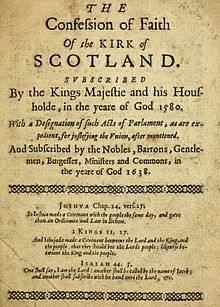Scots Confession
 | |
| Author | John Knox |
|---|---|
| Language | English |
| Genre | Confession |
Publication date | 1560 |
| Publication place | Scotland |
| Text | Scots Confession at Wikisource |
The Scots Confession (also called the Scots Confession of 1560) is a
In August 1560 the
While the Parliament approved the Confession on 27 August 1560,[3] acting outside the terms of the Treaty of Edinburgh to do so, Mary, Queen of Scots, a Roman Catholic, refused to agree, and the Confession was not approved by the monarch until 1567, after Mary's overthrow.[4] It remained the Confession of the Church of Scotland until it was superseded by the Westminster Confession of Faith on 27 August 1647. However, the confession itself begins by stating that the Parliament "ratifeit and apprevit [the confession] as wholesome and sound doctrine grounded upon the infallible truth of God's word"; thus, though changes within societies may have diminished its relevance, believers hold that the authority of its statements is rooted not in parliamentary approval but in, as it says, "the infallible truth of God's word".
In 1967, it was included in the
| Confession of Faith Ratification Act 1560 | |
|---|---|
| Act of Parliament | |
 | |
| Long title | The Confessioun of fayth professed and beleued be the protestantis within the Realme of scotland publischeit be thame in parliament and be the estaitis thairof ratifeit and apprevit as hailsome and sound doctrine groundit vpoune the infallibill trewth of godis word. |
| Citation | 1560 c. 1 |
| Text of the Confession of Faith Ratification Act 1560 as in force today (including any amendments) within the United Kingdom, from legislation.gov.uk. | |
As the Confession of Faith Ratification Act 1560, the Confession remains part of Scots law.[5]
Notes
- ^ González 1984, p. 83
- ^ Gray 1939, p. 140
- ^ Confession of Faith Ratification Act 1560.
- ^ Cochrane 2003, p. 160
- ^ Confession of Faith Ratification Act 1560.
References
- Cochrane, Arthur (2003), "The Scottish Confesion of Faith", Reformed Confessions of the Sixteenth Century, Louisville: Westminster John Knox Press, ISBN 978-0-664-22694-7, retrieved 5 February 2013
- ISBN 978-1-56563-522-7, retrieved 30 January 2013
- Gray, John (June 1939), "The Political Theory of John Knox", Church History, 8 (2), Cambridge University Press: 132–147, S2CID 162564925
- ISBN 978-0-310-40918-2, retrieved 26 November 2012
